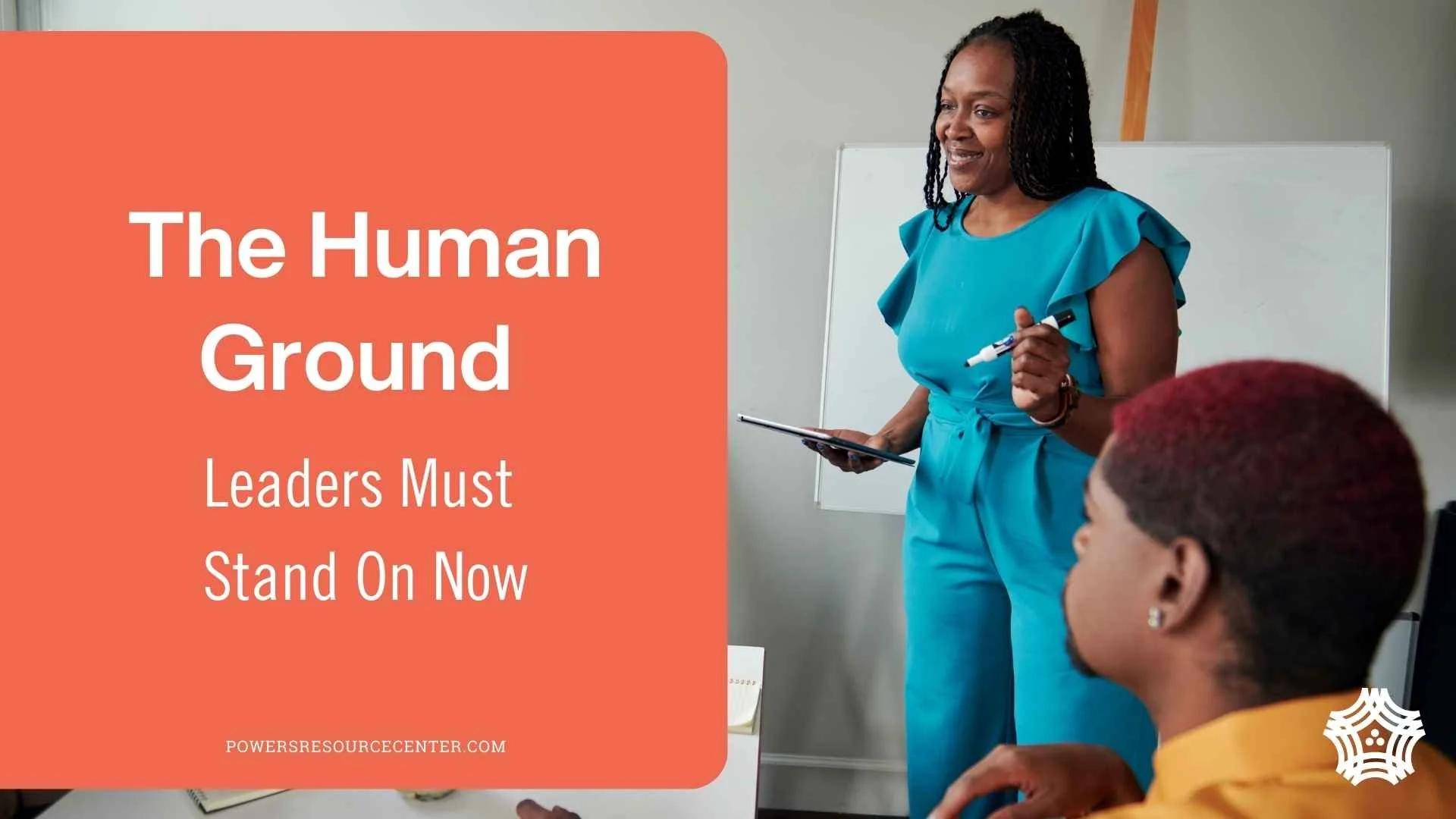Holding True: Gratitude for Workplaces That Lead with Humanity
READ on to learn about these two important tools…
Every November, as the pace of the year begins to slow and we naturally shift toward the holidays and a focus on gratitude, I find myself looking back at the organizations and leaders I’ve had the privilege of working alongside.
This year, one truth stands out more clearly than ever: The workplaces that thrive are the ones grounded in trust.
In a time when so much feels out of our control—markets, politics, technology, the pace of change—trust remains the foundation we can always return to. It’s the quiet, steady force that allows people to show up fully, connect authentically, and contribute their best ideas without fear.
And perhaps most importantly, it’s what transforms the workplace into what it was always meant to be: A place where people can be seen, valued, and heard.
At Powers Resource Center (PRC), we often introduce leaders to a model we love from the Integro Leadership Institute, which contrasts two very different mindsets: control-based and trust-based leadership.
This model helps leaders recognize something profound — that their belief about people is the root of every other decision they make.
If you believe people can’t be trusted, you create structures of control: rigid rules, micromanagement, and top-down communication. People disengage, innovation fades, and energy drains.
But if you believe people are trustworthy, you design an entirely different ecosystem: one built on partnership, autonomy, and shared accountability. People rise to the occasion, take ownership, and become genuinely invested in the mission.
That shift — from control to trust — is where every meaningful culture transformation begins.
WATCH: Navigating the Human Side of Organizational Transformation
We spend the majority of our waking hours at work. Whether we like it or not, workplaces shape how we think, how we communicate, and how we relate to others. That’s why I often call the workplace the center of influence.
When an organization chooses to lead with trust, respect, and values, the effects don’t stop at the office door. They ripple outward — into families, communities, and relationships.
We’ve seen this firsthand across dozens of companies we work with at PRC. When people experience being respected and trusted at work, they take that sense of empowerment home. They listen better. They model collaboration. They approach conflict with curiosity rather than defensiveness.
That’s the real power of conscious leadership — it changes how people show up everywhere in their lives.
EXAMPLE:
Building a Culture of Trust in a Utility Company
Earlier this year, we worked with a large energy provider that was experiencing high turnover and low morale among middle managers. On paper, the company looked strong: competitive pay, benefits, stability. But below the surface, employees felt micromanaged and undervalued.
When we introduced our programs and included the Trust-Based Leadership model, something clicked. The executive team realized they were unintentionally operating from a control-based mindset — relying heavily on compliance and oversight rather than partnership.
We began by facilitating group coaching sessions focused on emotional intelligence and empowerment. Leaders practiced shifting their approach from “my way” to “our way,” learning to delegate not just tasks but trust.
Within six months, the difference was visible:
Engagement scores rose by 18%.
Turnover dropped dramatically in one division.
Leaders reported fewer “fire drills” and more proactive problem-solving.
Employees described feeling “seen and supported” for the first time in years.
When leaders began to trust their people, their people began to act more responsibly. That’s the paradox of leadership — control often breeds chaos, while trust breeds order.
EXAMPLE:
Transforming a Post-Merger Executive Team
Another powerful example comes from a client in the healthcare industry who recently went through a major merger. The newly combined executive team was struggling to integrate — two distinct cultures, leadership philosophies, and communication styles clashing under pressure.
PRC facilitated a Five Behaviors of a Cohesive Team workshop and ongoing executive coaching. The turning point came when the team collectively acknowledged a hard truth: while both organizations had successful histories, trust had not yet been earned between them.
Through vulnerability-based trust exercises and shared value alignment sessions, we saw the team move from guarded to open — from protecting turf to co-creating solutions.
Six months later, the CEO told us:
“We’re finally operating as one team. There’s no more ‘us and them.’ People are thinking beyond their silos. And it’s contagious — our managers are starting to mirror it.”
When leaders model trust, the organization follows.
Trust isn’t just a feel-good principle. It’s a business strategy.
Companies that invest in trust-based cultures consistently outperform their peers in engagement, retention, and innovation. Why? Because people who feel trusted take initiative. They problem-solve faster, collaborate more naturally, and stay longer.
One of my favorite questions to pose to leadership teams is:
“Who are you going to attract if you don’t care about your people?”
In an era where talent has choices, the answer is clear — not the people you want.
Trust attracts talent. Control repels it.
And the organizations that understand that difference are building workplaces that will thrive well into the future.
EXAMPLE:
A Tech Company’s Shift from Fear to Empowerment
A mid-sized tech firm approached PRC because their employees were showing signs of burnout and disengagement. They were growing fast but had become consumed by deadlines, pressure, and perfectionism.
When we surveyed the team, the message was loud and clear: “We feel like we can’t make mistakes.”
Together, we co-created a trust charter — a simple document that outlined how team members wanted to experience one another. It included commitments like:
“Assume positive intent.”
“Communicate openly, even when it’s hard.”
“Give feedback to grow, not to judge.”
“We all own our results.”
Leaders began modeling these behaviors through weekly stand-ups and check-ins. They shared their own mistakes publicly and invited others to do the same. Within a quarter, innovation metrics and retention improved.
Employees said things like, “I finally feel safe to speak up again.”
That’s the kind of transformation trust enables — not through new software or processes, but through a shift in human behavior and belief.
As AI, automation, and technology continue to reshape how we work, the organizations that will thrive are the ones doubling down on human skills.
Empathy.
Self-awareness.
Emotional regulation.
Adaptability.
Communication.
These are no longer “nice to have.” They are power skills — the skills that allow humans to do what machines can’t: connect, inspire, and lead.
At PRC, we’ve built our coaching and training programs around these competencies because they are the backbone of trust-based leadership.
When people learn how to communicate with emotional intelligence, how to manage conflict with respect, and how to stay curious rather than defensive — everything changes.
Teams move faster.
Leaders coach instead of command.
People become self-directed instead of waiting for permission.
That’s where real ROI lives. Not in the newest trend, but in the oldest truth: people perform best when they feel trusted and valued.
As 2026 approaches, this is the question I encourage every organization to ask:
“Where do we stand right now — control-based or trust-based?”
Do your leaders rely on oversight and compliance, or do they build partnerships grounded in mutual respect?
Do your employees feel like they belong, or like they’re constantly being measured?
Do people show up because they have to, or because they choose to?
If you’re not sure where your culture stands, the Employee Passion Survey is a great place to start.
This research-backed assessment measures the emotional connection between employees and their work — and helps leaders pinpoint exactly where trust may be breaking down.
It’s an illuminating process, one that has guided many of our clients toward breakthrough insights and stronger engagement strategies.
Because you can’t improve what you don’t understand — and understanding begins with asking the right questions.
Once you know where your organization stands, the next step is creating a consistent, supported pathway for growth.
Group Coaching: The Best ROI in Leadership Development
Our Group Coaching Programs at PRC are designed precisely for this — to cultivate trust-based leadership at every level. Unlike one-off workshops that inspire but fade, group coaching gives leaders the time, space, and accountability to turn insight into sustained behavioral change. Through reflection, shared learning, and peer dialogue, leaders develop the emotional intelligence, composure, and strategic thinking required to lead with confidence and care.
We’ve seen the difference this approach makes. In one recent PRC program with a group of senior leaders, participants reported measurable growth in key leadership areas — including self-awareness, communication, emotional intelligence, and strategic focus.
After completing the program:
100% gained clarity on their leadership strengths and development opportunities.
100% said they’re actively using new tools and strategies in their roles.
80% reported improved ability to manage stress and maintain composure under pressure.
80% are applying more strategic thinking and time prioritization to leadership decisions.
80% feel more confident in their ability to lead and support their teams effectively.
Beyond the data, the stories say it best. One participant shared, “I’ve learned how to ask better questions and get my team’s input instead of solving everything myself.” Another said, “This program helped me feel more grounded and less reactive under pressure — something I needed.”
These aren’t abstract outcomes; they are visible culture shifts. Leaders began delegating more effectively, communicating with empathy, and managing change with steadiness. Their teams responded in kind — with stronger engagement, collaboration, and trust.
For an investment of less than $8,000 per leader, organizations are seeing strategic development directly aligned to business needs, reduced burnout, higher retention, and tangible performance improvements. The ROI is clear: when leaders evolve, teams thrive.
As one executive summed it up:
“I used to think leadership was about having all the answers. Now I realize it’s about asking better questions — and trusting my people to find the answers with me.”
That shift — from command to curiosity — is the essence of modern leadership. It’s what transforms compliance into commitment.
And it’s why group coaching continues to be the single most effective investment in leadership growth today.
WATCH: How to Assess Your Resilience at Work
This November, I want to express deep gratitude to the companies that continue to hold true to their values, even when it’s not easy.
➡️ To the organizations that prioritize respect, trust, and partnership over fear and control — thank you.
➡️ To the leaders who pause long enough to listen, to see the whole person in front of them — thank you.
➡️ To the teams who remind us that collaboration is stronger than competition — thank you.
You are shaping the future of work not through slogans or systems, but through the simple, radical act of caring about your people.
And that care doesn’t go unnoticed. It’s what makes your employees want to stay. It’s what makes them bring their best selves to work. It’s what makes your workplace not just a place to earn a paycheck, but a place to belong.
Keep Holding True
In times of uncertainty, it’s tempting to grasp for control. But control is a short-term comfort. Trust is a long-term strategy.
When we invest in trust, we invest in people — and people are the most powerful renewable resource any organization will ever have.
So as we close this year and prepare for the next, I encourage you to take a moment to appreciate the culture you’re creating. Notice where trust already exists, and where it could be strengthened.
Because every act of trust — every open conversation, every shared decision, every moment of respect — contributes to a larger ripple that extends far beyond your walls.
That’s the legacy of trust-based leadership. And it’s the legacy I’m endlessly grateful to witness every single day.
Keep holding true. The ripple you create matters.














